SpaceX Dragon
Within a few years, U.S. astronauts will be able to launch to the International Space Station from the U.S., instead of traveling to Russia as they’ve been doing since the end of the space-shuttle program in 2011, NASA said on Tuesday. NASA said it has chosen Boeing and SpaceX to develop crew-carrying spacecraft by 2017. “Turning over low-Earth orbit transportation to private industry will allow NASA to focus on an even more ambitious mission — sending humans to Mars,” said NASA Administrator Charlie Bolden. NASA will allot $4.2 billion to Boeing’s effort and $2.6 billion to SpaceX.
The contracts specify that the Commercial Crew vehicles must comprise a fully integrated rocket and spacecraft system that can launch, maneuver in orbit, and dock to the space station. After each company’s test program has been completed successfully and its system is certified by NASA, each contractor will conduct at least two, and as many as six, crewed missions to the space station. These spacecraft also will serve as a lifeboat for astronauts aboard the station. NASA astronauts and other staff will participate as partners in the development and testing of the new technology. The companies will own and operate the crew transportation systems and can sell their services to other customers in addition to NASA.
Boeing said it will build three CST-100 vehicles at its facility at Kennedy Space Center in Florida. The spacecraft will undergo a pad-abort test in 2016 and an uncrewed flight in early 2017, leading up to the first crewed flight to the ISS in mid-2017. The CST-100 will transport up to seven passengers in a capsule that will be blasted into space atop a rocket and return to Earth beneath a set of parachutes, similar to today’s Russian Soyuz system. SpaceX says its Dragon Version 2 spacecraft, which also launches atop a rocket, will be able to land with the aid of thrusters, “with the precision of a helicopter,” then refuel and fly again, “for rapid reusability.” The first manned test flight is expected in two to three years, according to the SpaceX website. Sierra Nevada Space Systems also was in the running for the NASA contract, but was left out.


































